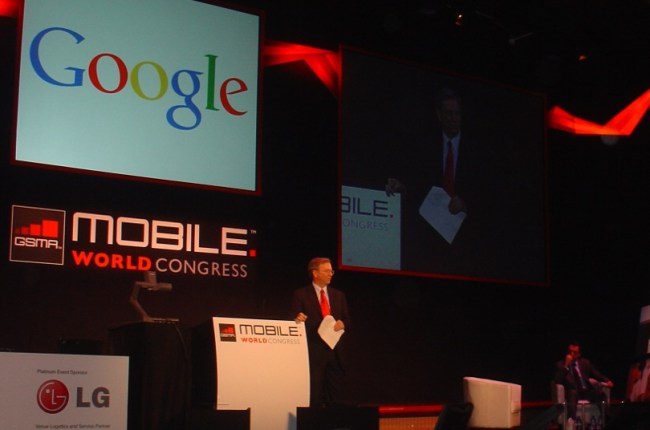

Though he didn’t stop for applause, listening to Eric Schmidt today felt like watching a president lay out starry-eyed plans for the future of the nation. The outgoing Google CEO spoke at the Mobile World Congress in Barcelona today and said his appearance at this large mobile event was only appropriate because Android is the fastest growing platform in the world. He began with a reminder of how far Google has come in a year.
The State of Android
- 300,000 handset activations per day (and “growing fast”)
- 170 Android devices on the market
- 27 different manufacturers make Android devices
- 169 different wireless carriers carry Android
- 69 countries around the world are infected with Google’s OS
- 150000 apps in the Android Market, which has tripled in nine months
After the flurry of competitor-crushing numbers, Schmidt gave attendees a broad pep talk on just how far mobile and cloud computing has come and where Google plans to go from here in search and mobile.
“Computers are here to make us happier. They do the stupid stuff. The stuff that bugs us,” said Schmidt. “In the next decade, because I’m a computer scientist, I believe very strongly in the optimistic view of what we can do with computers and science. If you look at problems like global warming, terrorism and financial transparency, they can all be helped by computing power. Those are fundamentally information problems, and that’s what computer science is about.”
Computing has changed, however. For the first time, smartphones are outselling PCs. Schmidt claimed this trend of smartphone dominance will only grow. Unfortunately, “the PC isn’t going to catch up” said the CEO.
Autonomous search knows you
Much of Schmidt’s talk centered around a new type of personalized search. Instead of you typing things into Google, Schmidt hopes that Google can begin to learn what you want before you want it. “With your permission,” Android phones could begin to track some of your actions and purchases and movements to learn more about you and what you like to do and buy. Then, using GPS and other location-based tools, Google can alert you if you pass by your favorite store and a big sale is happening on your favorite brand of jeans. Or it can help you decide what to do for fun, already knowing your tastes. Perhaps it will even know you are typically bored on Saturday nights and suggest an activity or notify you where your friends are? We’re not sure how far Google plans to go, but its clear that Schmidt and his colleagues see a bright future for cloud computing that stores information about us all.

In addition, Google has already been trying to save time. Google Instant Search and other recent database enhancements have shaved many seconds off of each search users make. “We ultimately believe that speed matters, that your time matters, that we can get you back to being a human,” said Schmidt, explaining Google’s motives.
The cloud can save it, forever
In addition to search, Schmidt alluded to phones that were so connected that if your phone crashed while reading a Google eBook, you could go to the store, activate a new device, and rejoin your book on the exact page you left off in minutes. Features like these will become more prevalent as LTE networks and other high-speed Internet connections increase in the years to come. Mobile speeds have increased 60 percent in this year alone, Schmidt claimed. Consumers may not have realized it, however, because demand has risen even faster.
“Pretty soon, in a year or two, with the phones many of you have already and the tablets, you will never forget anything. Starting soon it will be possible to remember the hotels you went to, the pictures you took, the friends you met, because computer memories last forever,” said Schmidt.
And yes, he also told us we’re going to have to deal with two billion people entering the Internet in next 3-4 years thanks to increases in mobile availability. Hopefully they won’t all be Justin Bieber fans.
Update: To read up on the Q&A session Schmidt held after his speech, head here. He fielded questions on Facebook, Twitter, Nokia, and Android Ice Cream, among other things.


